
Two weeks ago, Maria and I completed
one of our dreams
when we arrived in
Cap de Creus, where the Pyrenean range sinks in the
Mediterranean. To get there, we walked hundreds of kilometres during a month,
crossed dozens of steep valleys and enjoyed one of the richest experiences
of our lives.
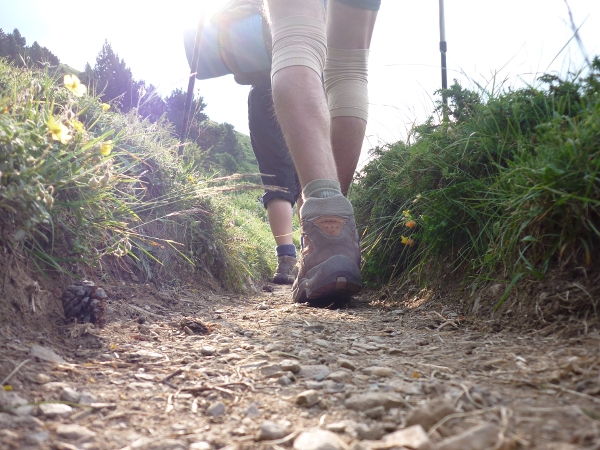 We managed to complete this challenge without facing major problems or
pains, and after the first five our six days, our legs seemed to have
gotten used to the daily effort and it started to be easier and easier.
Our morale kept growing as days passed and we advanced east. When I
started walking on a cold and rainy morning in Hondarribia, after barely
no rest in the night bus to Ir n, I thought for myself that it was
improbable that we'd manage to get anywhere near Catalunya, that one of
us would get injuried way before, or we'd just give up and go for the easy
beach vacation in the Basque Country.
We managed to complete this challenge without facing major problems or
pains, and after the first five our six days, our legs seemed to have
gotten used to the daily effort and it started to be easier and easier.
Our morale kept growing as days passed and we advanced east. When I
started walking on a cold and rainy morning in Hondarribia, after barely
no rest in the night bus to Ir n, I thought for myself that it was
improbable that we'd manage to get anywhere near Catalunya, that one of
us would get injuried way before, or we'd just give up and go for the easy
beach vacation in the Basque Country.
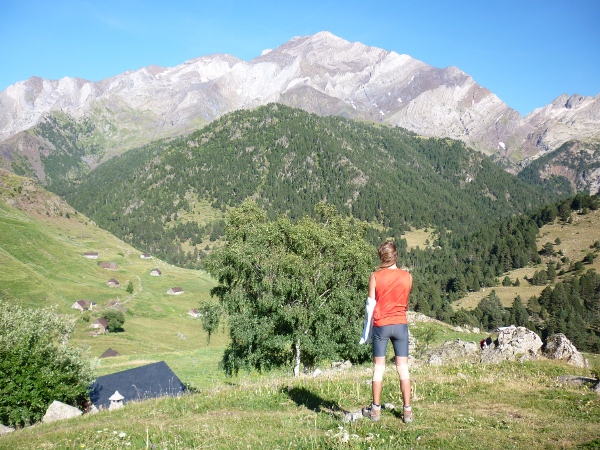
Biad s refuge, under Posets
But we didn't, and after a somewhat painful start, with our boots soaking
wet during the stages that crossed the enchanting Selva de Irati
which ended up with me getting the biggest blister I've ever seen, we
started to walk farther every day, extending the stages when we
felt strong after reaching their official end. When we crossed from
Nafarroa to Aragonese territory, the mental wall that I had built over the
toughest stages in our quest started to fall apart. Days later, we found
ourselves climbing down to Pineta, leaving Ordesa behind and enjoying a
feeling that our adventure could not go better. The weather had been
perfect for over a week and our legs and back were strong to go all over
the way to the sea.
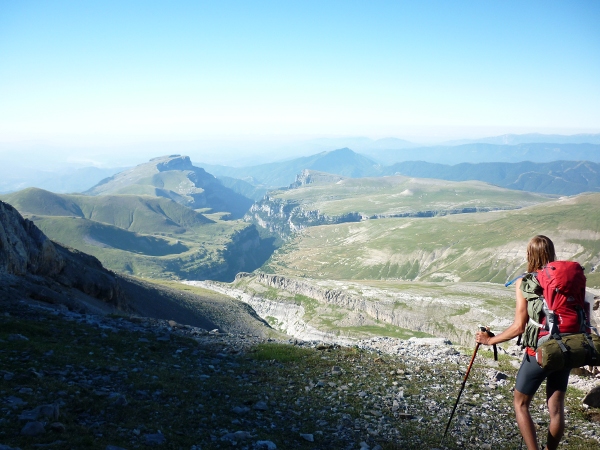
Ca n de A isclo, on our way to Pineta
When we finally saw that huge blue stain on the horizon, the day before
getting to the last mark, we got really excited. We had made it, but as we
walked towards the cape, happiness slowly got mixed with melancholy. An
unforgettable adventure was about to end, and we didn't want to face our
return to the city and our routines. It had been many days surrounded only by
awesome landscapes, and living without watches, with only sunlight and
weariness marking the time to get in our sleeping bags.
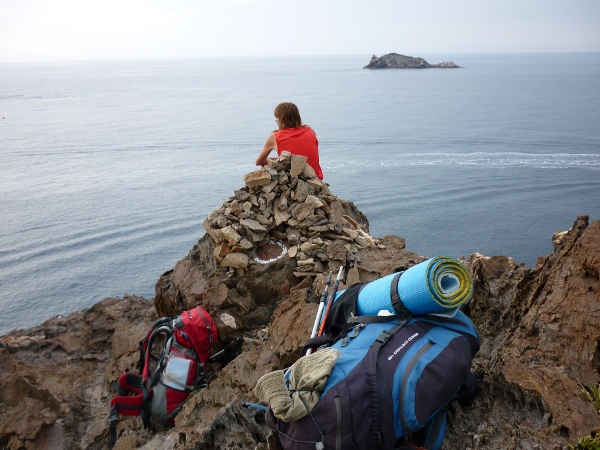
At the very last red and white mark of our journey
We've had plenty of time to meet great people. Starting with
the Navarrian brothers we met in the early stage, which provided us with a
good pace to follow while our leg muscles were still building up; or Kike
and Ana, who drove from Pamplona to visit us during the first Aragonese
stages (thanks for the supplies!). Tom s and Roger, young hikers from
Matar , surprised us with their maturity and experience as mountaineers;
we had the pleasure to join forces during four days, walking a really cool
variant through the Infiernos and Collado del Letrero
which avoided going through the ghost city of Panticosa. Roger and Tom s,
we really hope to meet you soon! Andreu, Manel, Ghandi and Ga la visited us
at the Vall de N ria and were unlucky to suffer a frightening
hail and thunder storm when they left our shelter on their way back to
their car. Thanks! All of you have been a very special part of our
experience!
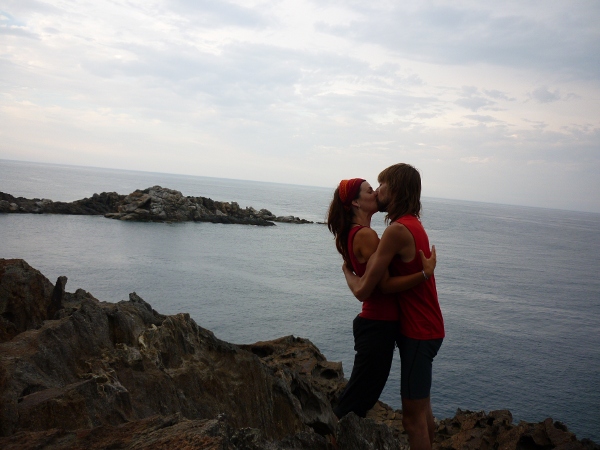 This adventure through GR 11 has been incredibly positive for us for
several reasons. We've learned a lot about ourselves and strengthened our
relation, and now I know how powerful drive can be; to get somewhere, no
matter how far, it's really easy if you just believe you can do it and
desire to get there.
Maria and I are proud of what we've done, and no wonder we're looking
for new challenges. An obvious one would be repeating this experience,
going through the French side of the Pyrenees, but for now, the Corsican
GR 20 seems the most appealing. We'll see, next summer!
This adventure through GR 11 has been incredibly positive for us for
several reasons. We've learned a lot about ourselves and strengthened our
relation, and now I know how powerful drive can be; to get somewhere, no
matter how far, it's really easy if you just believe you can do it and
desire to get there.
Maria and I are proud of what we've done, and no wonder we're looking
for new challenges. An obvious one would be repeating this experience,
going through the French side of the Pyrenees, but for now, the Corsican
GR 20 seems the most appealing. We'll see, next summer!
 This past weekend I've had the pleasure to join our friends from Valls,
in the Camp de Tarragona, for our annual Cal otada in Picamoixon's
countryside. This was the
fourth
time in a row I
attend, and as always, it's been a blast, even if Enric and Clara weren't
there, and the Valencian group was reduced to just 5 of us.
Unfortunately I had my share of alcohol on Friday evening/night while
partying with my workmates so when we got to Tarragona I was basically
wasted. This made me not want to take a single sip of any kind of beverage
not consisting of a 100% of water during the two days, but that didn't, of
course, spoil a single moment of fun.
Again, we've had the full traditional pack: prepare, cook and enjoy the
delicious cal ots; our share of mayhem just after eating them, during the
cal ot war, which this time resulted in a really filthy face and
hair; our little walk around the area, including a visit to the chapel of
the altar boy ; play in the metres tall mountains of gravel in the quarry
and a brief visit to the ruins of an abandoned house, to discover none
of its floors have colapsed yet.
This past weekend I've had the pleasure to join our friends from Valls,
in the Camp de Tarragona, for our annual Cal otada in Picamoixon's
countryside. This was the
fourth
time in a row I
attend, and as always, it's been a blast, even if Enric and Clara weren't
there, and the Valencian group was reduced to just 5 of us.
Unfortunately I had my share of alcohol on Friday evening/night while
partying with my workmates so when we got to Tarragona I was basically
wasted. This made me not want to take a single sip of any kind of beverage
not consisting of a 100% of water during the two days, but that didn't, of
course, spoil a single moment of fun.
Again, we've had the full traditional pack: prepare, cook and enjoy the
delicious cal ots; our share of mayhem just after eating them, during the
cal ot war, which this time resulted in a really filthy face and
hair; our little walk around the area, including a visit to the chapel of
the altar boy ; play in the metres tall mountains of gravel in the quarry
and a brief visit to the ruins of an abandoned house, to discover none
of its floors have colapsed yet.
 A great finish for a great weekend is getting to visit Jordi and Anna,
after 3 years of no luck, and finally meeting their lovely 2.5 years old
daughter Martina.
This weekend just rocks, and I'm already looking forward to next year's!
A great finish for a great weekend is getting to visit Jordi and Anna,
after 3 years of no luck, and finally meeting their lovely 2.5 years old
daughter Martina.
This weekend just rocks, and I'm already looking forward to next year's!
 I'm happy to meet so many friends from the
I'm happy to meet so many friends from the
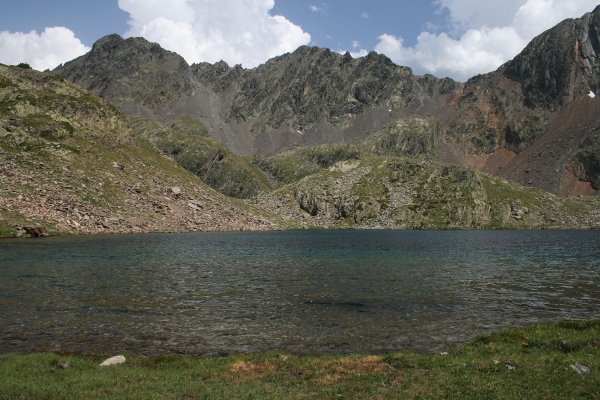
 We managed to complete this challenge without facing major problems or
pains, and after the first five our six days, our legs seemed to have
gotten used to the daily effort and it started to be easier and easier.
Our morale kept growing as days passed and we advanced east. When I
started walking on a cold and rainy morning in Hondarribia, after barely
no rest in the night bus to Ir n, I thought for myself that it was
improbable that we'd manage to get anywhere near Catalunya, that one of
us would get injuried way before, or we'd just give up and go for the easy
beach vacation in the Basque Country.
We managed to complete this challenge without facing major problems or
pains, and after the first five our six days, our legs seemed to have
gotten used to the daily effort and it started to be easier and easier.
Our morale kept growing as days passed and we advanced east. When I
started walking on a cold and rainy morning in Hondarribia, after barely
no rest in the night bus to Ir n, I thought for myself that it was
improbable that we'd manage to get anywhere near Catalunya, that one of
us would get injuried way before, or we'd just give up and go for the easy
beach vacation in the Basque Country.



 This adventure through GR 11 has been incredibly positive for us for
several reasons. We've learned a lot about ourselves and strengthened our
relation, and now I know how powerful drive can be; to get somewhere, no
matter how far, it's really easy if you just believe you can do it and
desire to get there.
Maria and I are proud of what we've done, and no wonder we're looking
for new challenges. An obvious one would be repeating this experience,
going through the French side of the Pyrenees, but for now, the Corsican
GR 20 seems the most appealing. We'll see, next summer!
This adventure through GR 11 has been incredibly positive for us for
several reasons. We've learned a lot about ourselves and strengthened our
relation, and now I know how powerful drive can be; to get somewhere, no
matter how far, it's really easy if you just believe you can do it and
desire to get there.
Maria and I are proud of what we've done, and no wonder we're looking
for new challenges. An obvious one would be repeating this experience,
going through the French side of the Pyrenees, but for now, the Corsican
GR 20 seems the most appealing. We'll see, next summer!
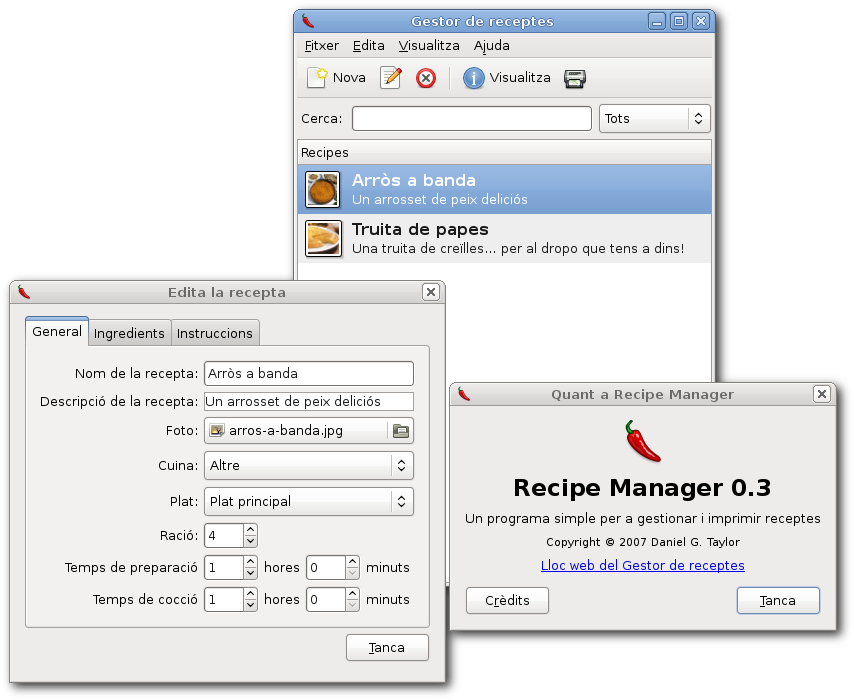
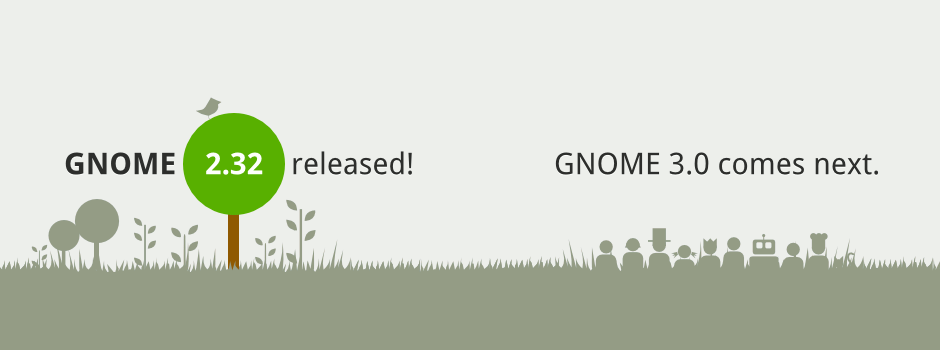
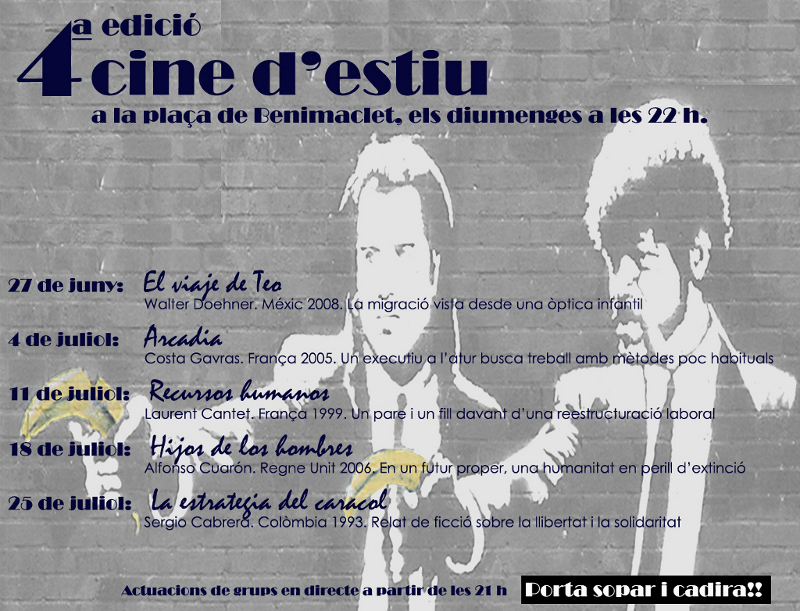
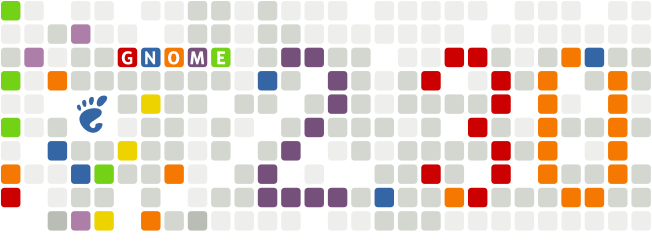
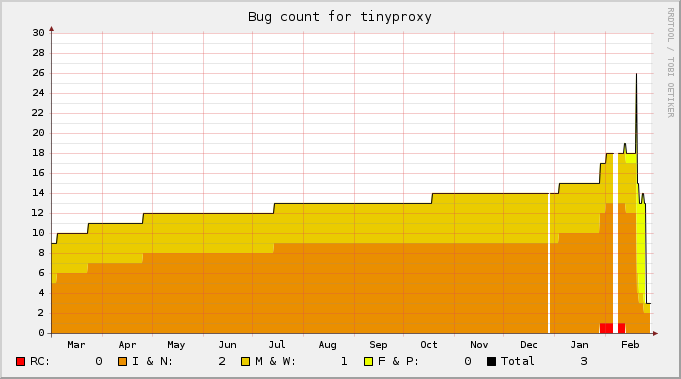 They were happy to get a few bugs and patches forwareded upstream, and
asked me why all of this hadn't happened before. Pitty is that a few
longstanding issues were well known in Debian but not so obvious for the new
upstream maintainers, and are present in 1.8.0. Hopefully all will be
dealt with in 1.8.1 or the next major version. The lesson is: if you work on an
apparently abandoned package, after cleaning the mess in your NMU, try to
spend 15 more minutes trying to contact upstream (if available), pointing
them at the patch tracker and our list of bugs: chances are many are still
useful. Also, contact the Debian maintainer, and if they ask you to take over,
at least post a RFA so someone else can.
If you're a Tinyproxy user, I'd be happy to hear if the current package in
Debian unstable works for you. If you were having weird issues with 1.6.x,
chances are 1.8 will fix them. The package can be installed on stable
with no extra dependencies, so if you're feeling adventurous, go ahead and
upgrade.
They were happy to get a few bugs and patches forwareded upstream, and
asked me why all of this hadn't happened before. Pitty is that a few
longstanding issues were well known in Debian but not so obvious for the new
upstream maintainers, and are present in 1.8.0. Hopefully all will be
dealt with in 1.8.1 or the next major version. The lesson is: if you work on an
apparently abandoned package, after cleaning the mess in your NMU, try to
spend 15 more minutes trying to contact upstream (if available), pointing
them at the patch tracker and our list of bugs: chances are many are still
useful. Also, contact the Debian maintainer, and if they ask you to take over,
at least post a RFA so someone else can.
If you're a Tinyproxy user, I'd be happy to hear if the current package in
Debian unstable works for you. If you were having weird issues with 1.6.x,
chances are 1.8 will fix them. The package can be installed on stable
with no extra dependencies, so if you're feeling adventurous, go ahead and
upgrade.
 The local government of PP, led by the infamous Rita Barber , knows that
getting the anti-riot police in the neighbourhood and forcing very old men
and women out of the houses where they were born isn't what many people like to
see in the evening news. They also know time is their ally; this plan is
many decades old, and there's no need to hurry now, so it's better to apply
silent mafia tactics on the problem. It's very easy.
First, stop investing a single euro in the area and monitor the slow but
effective results of the degradation. Have a bit of patience, and after
quite a few years, start promoting the illegal occupation of the increasing
number of empty houses by marginal collectives which will bring the associated
introduction of drug dealing in the area. This will surely make even more
people leave or accelerate their decease. Keep repeating this process, until
the Cabanyal is really fucked up. Now, start promoting the rehabilitation
plan , which unavoidably includes splitting the neighbourhood in two
pieces, and destroying a substantial part of it. Hopefully, many of the
neighbours not directly affected by the demolitions will back the plan, they
can't be blamed for being really fed up after all. Do all you can to confront
those in favour to those against. In the meanwhile, start harrassing owners,
make them end up selling their property at ridiculous prices and as soon as
this happens, demolish it very quickly. Don't even bother with cleaning up the
rubble: an increasing number of sites like this all over the place may be
what makes a few more families give up and leave.
In the end, you either have an empty neighbourhood, or you've managed to
demolish all the annoying houses that block your shiny avenue. However, if a
Supreme Court argues that the remaining houses still have some
cultural value, you might want to consider changing your local law to
unprotect those architectural elements.
Today, many thousands of Valencians marched around Cabanyal to say
enough! . From the street, I saw several old women out on the balconies
of their beautiful houses, their eyes wet with tears, while they observed in
silence all that many people who were fighting for them. There's still a long
way to go in the courts until this is all over, but at least these people
have a little more hope today than those in el Carme or La Punta, who ended
up losing similar battles, years ago.
The local government of PP, led by the infamous Rita Barber , knows that
getting the anti-riot police in the neighbourhood and forcing very old men
and women out of the houses where they were born isn't what many people like to
see in the evening news. They also know time is their ally; this plan is
many decades old, and there's no need to hurry now, so it's better to apply
silent mafia tactics on the problem. It's very easy.
First, stop investing a single euro in the area and monitor the slow but
effective results of the degradation. Have a bit of patience, and after
quite a few years, start promoting the illegal occupation of the increasing
number of empty houses by marginal collectives which will bring the associated
introduction of drug dealing in the area. This will surely make even more
people leave or accelerate their decease. Keep repeating this process, until
the Cabanyal is really fucked up. Now, start promoting the rehabilitation
plan , which unavoidably includes splitting the neighbourhood in two
pieces, and destroying a substantial part of it. Hopefully, many of the
neighbours not directly affected by the demolitions will back the plan, they
can't be blamed for being really fed up after all. Do all you can to confront
those in favour to those against. In the meanwhile, start harrassing owners,
make them end up selling their property at ridiculous prices and as soon as
this happens, demolish it very quickly. Don't even bother with cleaning up the
rubble: an increasing number of sites like this all over the place may be
what makes a few more families give up and leave.
In the end, you either have an empty neighbourhood, or you've managed to
demolish all the annoying houses that block your shiny avenue. However, if a
Supreme Court argues that the remaining houses still have some
cultural value, you might want to consider changing your local law to
unprotect those architectural elements.
Today, many thousands of Valencians marched around Cabanyal to say
enough! . From the street, I saw several old women out on the balconies
of their beautiful houses, their eyes wet with tears, while they observed in
silence all that many people who were fighting for them. There's still a long
way to go in the courts until this is all over, but at least these people
have a little more hope today than those in el Carme or La Punta, who ended
up losing similar battles, years ago.
